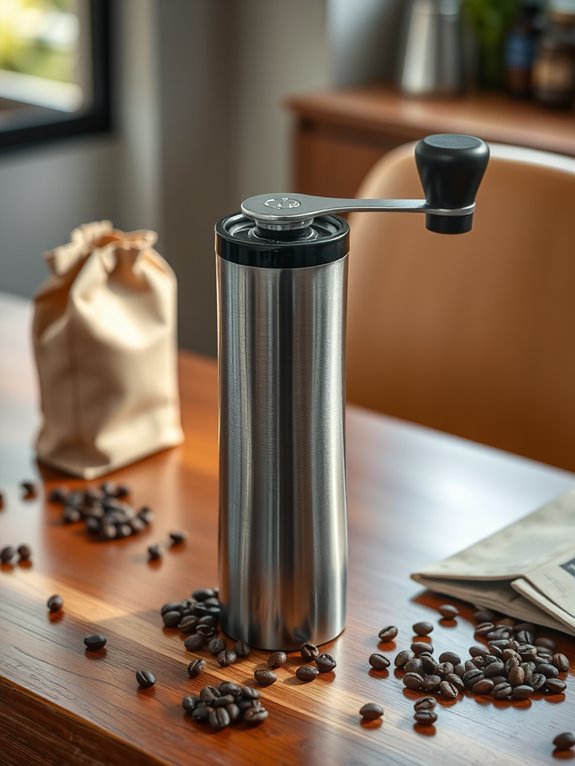What Coffee Beans Does McDonald’s Use?
If you're curious about what coffee beans McDonald's uses, let's investigate together. They choose 100% Arabica beans, favored for their smooth taste and moderate caffeine hit. These beans come from diverse regions like Honduras, Colombia, Peru, and Brazil, and McDonald's guarantees they're all Rainforest Alliance certified, supporting sustainable farming and environmental health. With Gaviña Gourmet Coffee as the primary supplier since 1983, their roasting process in Vernon, California, maintains the coffee's freshness and flavor quality. McDonald's dedication to quality control and sustainable practices highlights their commitment to providing an excellent coffee experience. There's more to uncover about their coffee expedition.
Key Takeaways
- McDonald's uses 100% Arabica beans known for their smooth flavor and moderate caffeine content.
- The beans are Rainforest Alliance certified, promoting sustainability and environmental health.
- Sourcing regions include Honduras, Colombia, Peru, and Brazil, providing diverse flavors.
- Gaviña Gourmet Coffee, McDonald's primary supplier since 1983, roasts the beans.
- McDonald's commitment to quality ensures consistency in flavor and high standards across locations.
Arabica Beans Sourcing

When it comes to sourcing coffee beans, McDonald's opts for 100% Arabica beans known for their smooth flavor and moderate caffeine content. These beans are sourced from various regions, including Honduras, Colombia, Peru, and Brazil.
You might wonder why McDonald's would choose Arabica beans in particular. Well, the answer lies in the bean's unique qualities, offering a smoother taste compared to other varieties. The moderate caffeine content also makes it an appealing choice for those who love coffee but prefer a less intense caffeine kick.
Like green coffee beans, these Arabica varieties contain chlorogenic acid compounds that may help regulate blood sugar levels.
Sourcing and Sustainability
Sourcing isn't just about picking any beans; McDonald's guarantees that all their coffee beans are Rainforest Alliance certified. This certification promotes sustainable farming practices, supporting environmental health.
By choosing beans from diverse regions, McDonald's not only assures a rich selection of flavors but also contributes to the global coffee farming community.
Quality Control
Quality control is a top priority. McDonald's employs stringent measures during the sourcing process to maintain consistency.
They focus on selecting the best beans and roasting them in-house. This attention to detail helps guarantee that every cup of coffee served meets the high standards you expect.
Flavor Profile and Roast
Crafting the perfect cup of coffee starts with understanding its flavor profile and roast. When you sip McDonald's coffee, you're experiencing the smooth richness of 100% Arabica beans. Known for their mild flavor and moderate caffeine content, Arabica beans are a favorite for many coffee lovers. Let's investigate how McDonald's creates that balanced, nutty, and chocolatey taste you enjoy.
Flavor Profile
Arabica beans offer a naturally smooth flavor profile. Sourced from Central and South America, these beans bring a pleasing blend of nutty and chocolate notes to your cup.
Compared to Robusta beans, McDonald's coffee is less acidic, making it a gentle wake-up call for your taste buds.
Roasting Process
The roasting process plays a vital role in enhancing these flavors. McDonald's conducts this process in-house to maintain freshness and bring out the beans' best characteristics.
This careful roasting guarantees that each cup you drink is consistent, rich, and satisfying.
Quality Control
Quality control is key. McDonald's implements strict measures during the sourcing and roasting process.
These controls assure that every cup meets their high standards, providing you with the same enjoyable experience, no matter where you are.
Like Lavazza Super Crema, McDonald's focuses on creating a light-medium roast that delivers an aromatic and mild flavor profile.
Suppliers and Partnerships

The foundation of McDonald's coffee excellence begins with its long-standing partnership with Gaviña Gourmet Coffee, its primary supplier since 1983. This collaboration started modestly with just 10 locations but has grown into a cornerstone of McDonald's global coffee identity.
Gaviña, founded in 1870 in Cuba and later established in Los Angeles, is renowned for its commitment to quality and tradition, ensuring that McDonald's serves only the best.
The Role of Gaviña
Gaviña plays an essential role in maintaining the quality of McDonald's coffee by supplying 100% Arabica beans. These beans are known for their superior taste and are roasted in Vernon, California, to guarantee freshness and flavor.
You might appreciate how this careful roasting process brings out the beans' distinct qualities, making each cup of McDonald's coffee enjoyable.
Beyond McDonald's
Interestingly, Gaviña doesn't only supply McDonald's. They also cater to major retailers with products like Don Francisco's Coffee and Café La Llave Espresso.
This broad network of partnerships highlights Gaviña's knowledge and reputation in the coffee industry, further reinforcing McDonald's choice of a reliable supplier.
Like Starbucks' Pike Place Roast, their medium roast coffee delivers a balanced and smooth flavor profile that customers have come to love.
Let's examine how this partnership contributes to the consistency you enjoy in every McDonald's coffee cup.
Sustainability and Ethics
While Gaviña's role in supplying quality coffee to McDonald's is vital, the relationship extends beyond just taste. It reflects a commitment to sustainability and ethics. Choosing 100% Rainforest Alliance certified beans, McDonald's guarantees the coffee you enjoy supports responsible farming practices.
This certification is important because it means:
- Environmental Health: The Rainforest Alliance promotes biodiversity and conservation of natural resources. This helps keep ecosystems thriving where coffee is grown.
- Sustainable Farming: By focusing on methods that improve soil health and conserve water, these practices help mitigate climate change impacts, securing long-term viability for coffee farming.
- Fair Trade Practices: Certification guarantees better working conditions and supports local economies. By prioritizing fair trade, McDonald's contributes to farmers' livelihoods and community development.
- Community Development: Supporting farmers through sustainable practices enhances their quality of life, leading to stronger communities in coffee-growing regions.
Let's investigate what this means for you. When you sip a McDonald's coffee, you're not just getting a delicious beverage; you're participating in a global effort to support ethical practices and sustainability.
This commitment guarantees that every cup contributes positively to the world, making your coffee experience more meaningful.
These sustainable practices complement the beans' natural antioxidant properties, which provide additional health benefits to consumers.
Conclusion
In exploring McDonald's coffee, you've found they prioritize Arabica beans known for their smooth flavor. Their roasting process guarantees a consistent taste, making each cup enjoyable. McDonald's collaborates with trusted suppliers to maintain quality, forming partnerships that support sustainable practices. By focusing on ethical sourcing, they aim to protect the environment and support farmers. So, next time you sip their coffee, remember it's crafted with care, quality, and a commitment to sustainability.







